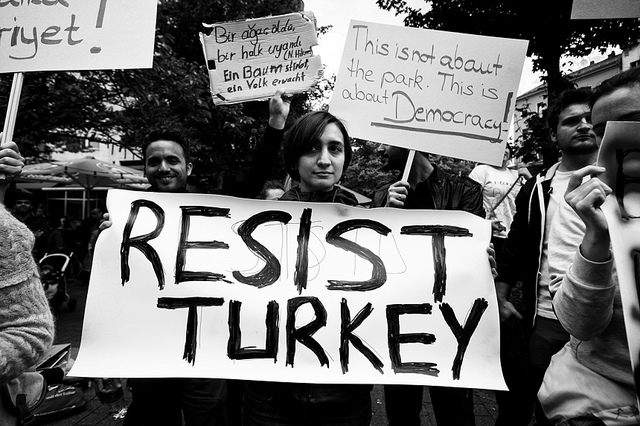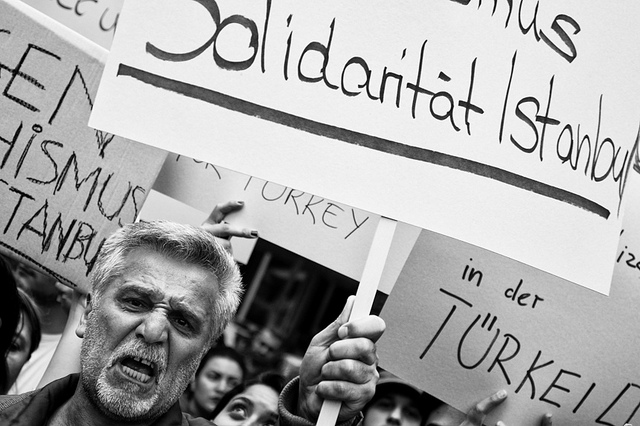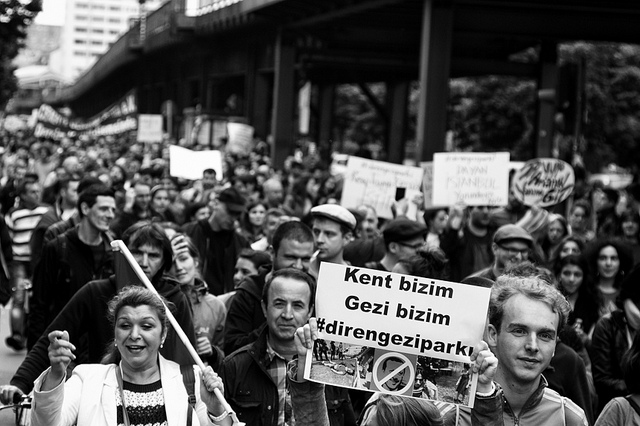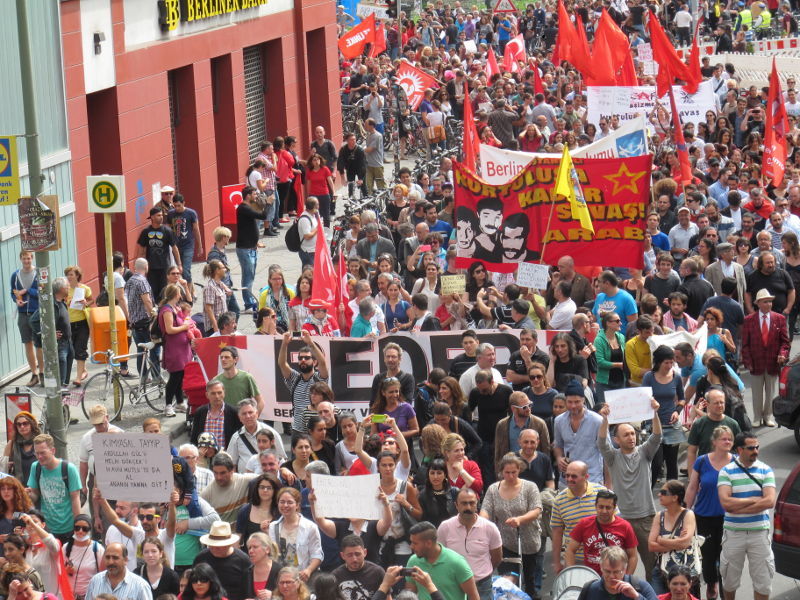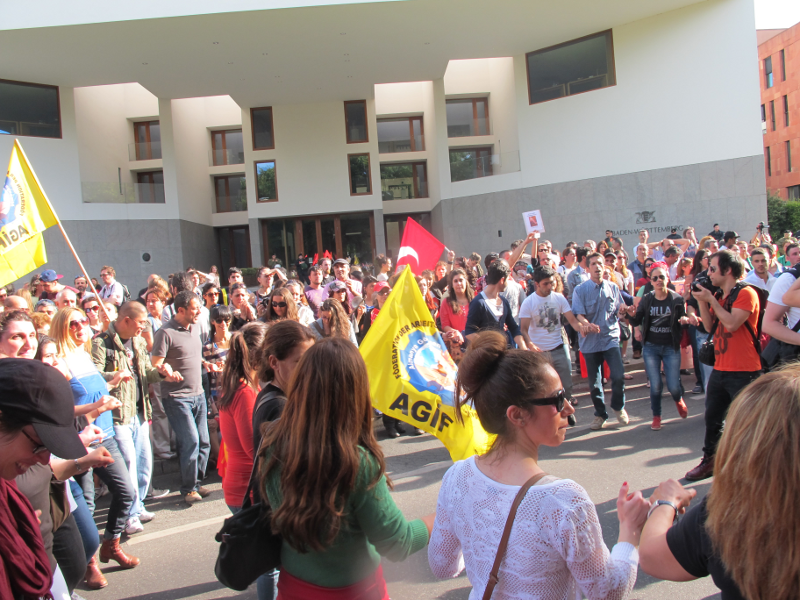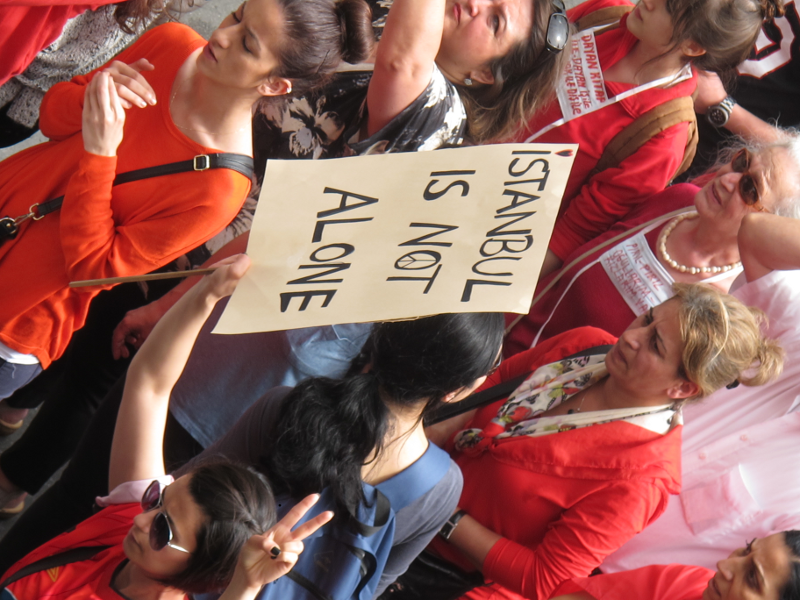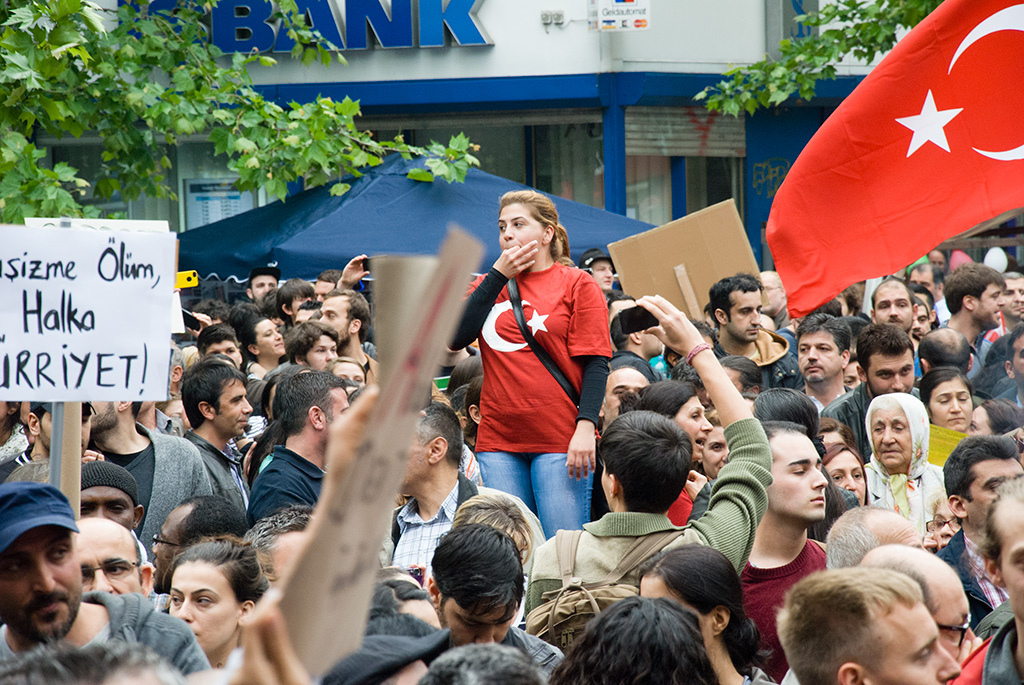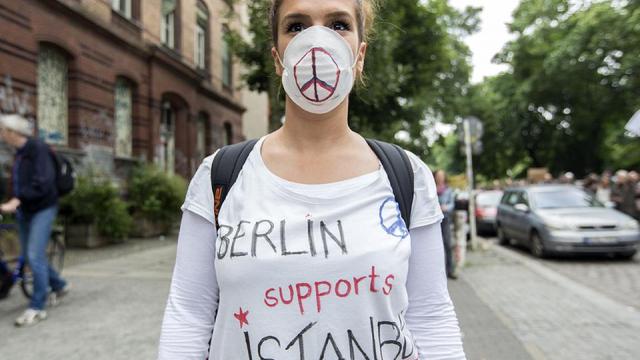
After a week of calm, demonstrators in Istanbul’s Taksim Square were at it again over the weekend. Faced with Turkish Prime Minister Recep Tayyip Erdoğan’s fierce crackdown, protestors were forced to clear their 18-day occupation of Istanbul’s Gezi Park early on the morning of June 16, and last weekend they regrouped to commemorate the four who had lost their lives during the unrest. On Sunday, June 23, police once again emptied the square using rubber bullets, water cannons and tear gas.
Igniting on May 31 in Istanbul, the Occupy-style movement rose in objection to the park's replacement with a shopping center and a replica Ottoman-era barracks. The demonstrations soon escalated into a full-force anti-government protest that spread to cities across the country, including the capital Ankara.
But meanwhile, many miles to the north in Germany — where Turks form the largest ethnic minority in the country, comprising five percent of the German population — support for the protests also grew.
In a capital city that is home to the largest Turkish population outside of Turkey, Berlin’s Kreuzberg district stands out as the most diverse mixture of Turkish ex-pats and German-born Turks. And to show their solidarity in the weeks since protesters flooded Gezi Park, Berlin's Turks have been marching, demonstrating and sitting-in to protest a government they feel is aiming to sever democratic rights in their homeland.
‘Capulcu’
During the previous weekend's demonstration, thousands of protesters filled Hermannplatz, one of Berlin’s large central squares, holding placards calling for democracy and international solidarity, echoing the demands of their compatriots back home. Pinar Şardar, who was raised in a secular family in Bursa, Turkey, and is completing her Masters degree in Berlin, said it’s crucial to support the protests in Istanbul, even from Berlin.
“It’s important because lots of Turkish people are living here from lots of different social and political backgrounds," said Pinar, “so we want to raise a voice and say that we are with you and we are supporting you. I know that Turkish politics are so dependent on the European Union and also Germany. So if we raise awareness here it will affect the politics.”
"In Turkey, there’s a lot of censorship,” she continued. “All the demonstrations at Gezi Park began because of the oppression of freedom of speech. It’s not only one part of Turkey that’s oppressed. First, leftist parties, then Kurdish people, then other people who don’t support Erdoğan… we are all part of this oppression.”
Many demonstrators in Berlin wear sticker name badges that say 'capulcu,’ with an anarchy symbol in place of an ‘A’. Capulcu, the name given to protesters by Erdoğan, means troublemaker. Here they wear the word with sarcastic pride.
Digdem Soyaltin is from Izmit, about 100 kilometers east of Istanbul, and moved to Berlin three years ago to finish her PhD. She had been visiting Istanbul when the protests erupted at Taksim Square, but since returning to Berlin she said she’s wary of the solidarity movement in the German capital.
“I think people are supporting somehow what’s happening in Turkey, but in Turkey it’s not really about fun, like a festival or picnic. It’s really harmful, it’s dangerous,” said Digdem. “So I’m having a problem linking what’s happening here… I mean, people are supportive, but I’m not so sure they really know what they are marching for.”
At the demonstration in Hermannplatz, speakers shouted through a megaphone in both German and Turkish about the need to oppose pressures from the Turkish government, and Digdem continued:
“I’m a political scientist so I know about Turkish politics. You can see the solidarity, but there are lots of fractions. There will be more problems in the future. Such fractions will become more robust – they want to defend their own values and they hardly overlap. Some of them are hardcore Kemalists, some of them are Kurdish liberals, conservative or liberal Islamist groups. I have no idea how they will come together and demand one thing. They have one enemy, Erdoğan – but then what happens next, I have no idea."
Since the protests began in Istanbul, activists in Berlin have continued to translate texts and literature into German and other languages to garner more attention about the uprising.
As demonstrators marched from Hermannplatz to Kottbusser Tor — an area in Kreuzberg so heavily populated with Turks it was once referred to as Little Istanbul — they gripped signs, flags and banners. Some carried messages from the Federation of Workers from Turkey in Germany, or ATIF, while others read “Occupy Gezi.”
When the march arrived at Oranienplatz for a planned sit-in, protesters crouched down on the lawn while others moved towards the stage where a Turkish band performed.
A young family waved a bright red flag depicting Mustafa Kemal Atatürk — the revolutionary statesman, founder of the Republic of Turkey and the country’s first president. The family's mother, Gousha, said that to her Atatürk symbolized peace, and his values were something she would like to see restored in her homeland.
Close by, an elderly gentleman smoking a cigarette in a dapper suit called himself Cemal, and said he moved from Turkey to Berlin in 1973. “As someone who lives in Germany, I’m here to show my solidarity with Istanbul, because of the pressures of the system,” he said. “We want a democratic situation all over the world, but at the moment it’s very important to support people in Turkey.”
Taksim is Everywhere
Café Kotti, located at Kottbusser Tor, is a local hangout for leftist Turkish intellectuals and a growing number of the neighboring international community. Beside the bar a poster states: “In this place no physical or verbal insult that is racist, homophobic, sexist or transphobic in content is tolerated.” Its walls are covered in photos of demonstrations and informational posters about Gezi Park and Taksim Square.
But the Turkish public and business owners surrounding Café Kotti are far less open about their politics. From food stands, bakeries and tobacco shops, no one wanted to discuss the resistance movement in Turkey. Yet just a block away, a tent had been erected with a massive banner that read, “Taksim is Everywhere, Everywhere is Resistance” in German.
For around two weeks the tent has been operating, 24 hours a day, standing as a beacon of international solidarity for the people in Istanbul – and as a stance against the brutal treatment of protestors there. On a more pragmatic level it offers information about those imprisoned along with up-to-date actions from activists in Istanbul via social media.
“It’s not about the park anymore, it’s about the conservative politics of Erdoğan and the process of Islamization over society,” said Mehmet, one of the many who sat at a picnic table in front of the tent, offering water or coffee to those that wanted to have a chat.
The scene there was unlike the processions in the Berlin streets, which galvanized mostly younger students and activists. These, on the other hand, were the locals – the working people, the middle-aged.
Given permission by the Berlin government to remain, those staffing the tent say they will stay on until their demands are met. “We will continue to protest until those imprisoned are set free,” said Mehmet.
Each evening, organizers have offered an open forum where anyone is welcome to have a seat, discuss solutions and voice an opinion about the conflit – and critical views are welcome.
“Our aim is for the people in Europe to become more aware of the situation in Turkey,” explained Meral, a women in her 40s. “We don’t have problems with people who support the government, we’re for unifying all people – Turkish, Kurdish and all ethnicities.”
3 WAYS TO SHOW YOUR SUPPORT
- Log in to post comments


